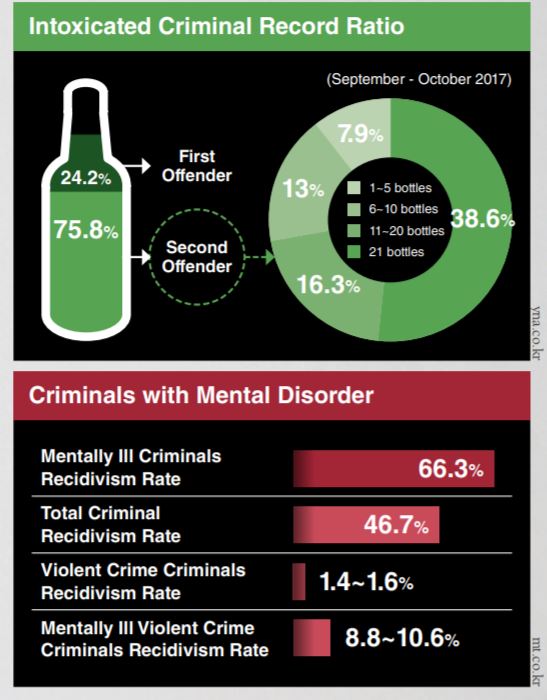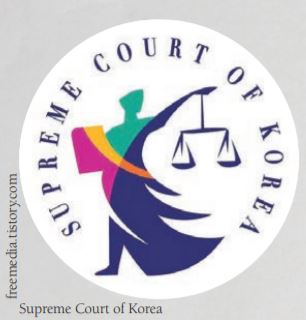On November 4th, the third trial of the Korean actor, Kang Ji-hwan was held. He was arrested in July 2019 on charges of quasirape of a sexually violent crime. However, Kang has insisted that he had no memories of the alleged incident after drinking. He is pleading for a mental disorder defense in the hope of reducing his sentence. Therefore, the Sungkyun Times (SKT) decided to look into the overall contents of Korea’s medical disorder defense that can lead to a lesser penalty for a given crime, its weaknesses, and the direction it should take.
What Is Medical Disorder Defense Penalty Reduction?
Medical disorder defense penalty reduction is a legislative term, meaning a state of poor judgment due to a mental disorder or the absence of consciousness. The defendant’s attitude can be determined during the investigation with the data indicated in the expert’s appraisals and records. From 2014 to 2016, there were 1,597 cases in which the defendant claimed to have a mental illness, but only 305 cases, which is about 20 percent, were recognized as real mental illnesses. Article 10.2 of the Criminal Code of the Republic of Korea states that the conduct of a mentally disabled person should not be punished at the same level as a normal person. This law is based on the principle of responsibility, which infers that the crime cannot be punished when it is done in an unconscious state, so offenders judged to be mentally challenged are sentenced according to this article. Starting from December 2018, however, the mandatory exemption for mentally challenged defendants was amended to an optional clause.
The Intoxication of Alcohol Punishment Reduction
Apart from mental illness, the intoxication of alcohol is also categorized under medical disorder defense punishment reduction. The state of intoxication, described in Article 10, only exists in Korea and Japan. After drinking, the ability for proper judgment is reduced. For this reason, Korea law recognizes being drunk as being mentally unstable. The National Police Agency said the number of suspected alcohol-related crimes stood at about 780,000 cases between 2016 and 2017. It resulted in public anger, especially with the *Cho Doo-soon case, leading to a revision of the law in which the judge can optionally disregard Article 10.2 in regards to sentencing sexual assault. However, despite this revision, a man, who sexually assaulted a former co-worker’s girlfriend in 2015, was only given probation based on the fact that he was drunk and regretted what he had done.
*The Cho Doo-soon Case
On December 11th, 2008, in Ansan, Gyeonggi-do, Cho Doo-soon kidnapped an 8-year-old girl going to school, took her to a nearby church and sexually assaulted her. - As the child resisted, he forced her head inside the toilet, which caused her to get tympanitis and damaged her eyesight. He also used a toilet plunger to get his semen out of the girl’s body, which pulled her internal organs out and destroyed her sphincter. - Cho Doo-soon had criminal records of sexual assault and murder. He also continuously changed his testimony. However, because he was drunk during the time of his crime, he was given sentences based on intoxication and only sentenced to 12 years in jail.
The Loopholes Regarding Sentencing
Abuse of Sentence Penalty Reduction
1. Mental Disorder Defense Penalty Reduction
The current Korean law is lax regarding the mental disorder defense. Therefore, many criminals try to get mental disorder penalty reduction. According to the statistics from Dong-A Ilbo in 2018, 40% of hate crimes are caused by mental disorders. Additionally, also from Dong-A Ilbo, the status data of criminal psychiatric evaluation in 2018 states that approximately 50% of people who received sentences based on mental illness sentences were judged not to have had any mental problem at the time of the crime. Even though the number of people who assessed psychological problems decreased by 27%, people who did not have mental illness increased by 42%. These statistics support the theory that the suspects pretend to have a mental illness by using psychoanalysis to receive a sentence penalty reduction. Yang Eun-kyung, a legal reporter for the Chosun Ilbo, said that defendants tend to overuse their requests for psychiatric tests to create an excuse for a penalty reduction in the sentence. An example of this case would be a murder done by a teenager. The murderer claimed to the accomplice, that she would guarantee not to leave any criminal records by insisting that she had a mental illness.
2. The Intoxication of Alcohol Punishment Reduction
The law regarding the intoxication of alcohol does not have strict restrictions. Due to this loophole, more crimes relating to the intoxication of alcohol is on the rise. According to the National Police Agency’s criminal statistics in 2018, over the past four years, the number of crimes caused by the intoxication of alcohol was 40% and within it, 18% of the criminals’ alcohol concentration level was uncertain. In 2018, a drunk man beat a 51- year-old man to death. He then claimed to have been too drunk and could not remember the events of the night. There is a law that states if a test is conducted falsely, the person should be punished. However, none of those who faked being mentally ill during the examinations have been penalized.
High Recidivism Rate
Those already with criminal records are more likely to easily convict again. According to the Research of National Police Agency, the recidivism rate for offenders diagnosed with mental illness was 65%, which is about 20% higher than the rate of regular offenders. Those who have run away from the treatment center have a 40% recidivism rate. For instance, Ahn In-deuk, a mental disorder patient was arrested for an act of violence in 2010, received a total of seven reports from his neighbors due to disputes in 2019. In the same year, he also committed a knife attack and an arson attack in Jinju. It is the same situation with alcohol-related crimes, according to statistics provided by Yonhap News Agency in 2017, crimes by repeat offenders accounted for 76 percent among all alcohol-related crimes.

The Possible Improvements of the Current Law
The unsynchronized medical and legal term causes confusion and the first step to improve this is to give it an accurate definition and standard. According to National Police University Professor Choi Yi-moon and Judge Lee Hye-rang, the United States (US) currently has 93% similarity with the verdicts of expert psychologists and court rulings. On the other hand, South Korea shares a similarity of 50% only. The low percentage of similarity is because the medical terms and legal terms do not share the same definition. Additionally, the court should keep strict procedures to prevent people from faking mental illness and punish them for obstructing the truth. Figuring out how to deal with mental disorder defense punishment reduction and concentrating on taking care of second offenders in terms of a legal viewpoint is necessary. For example, The Good Criminal Code of the US has a provision stating that if one brings oneself to intoxication, no protestation is allowed. Also, in the United Kingdom (UK), alcohol and drug abuse are used as modifiers to define criminals’ behavior. Therefore, South Korea seems to need to implement strict rules like these countries. Instead of keeping drunkenness under the category of the medical disorder defense, it would be better to keep involuntary intoxication under the category of a new law that imposes heavier punishments and proper mental health care.

Effective Way of Criminal Management
It is important to find an effective way to manage criminals diagnosed with mental illness. Therefore, finding a solution regarding criminal management will decrease the rate of recidivism. According to Baek Jong-woo, a professor at Kyunghee University, initial medication and treatment of mentally ill patients can reduce crime rates by up to 94%. Additionally, mentally ill patients who have committed crimes not only need a guaranteed treatment but also need to be punished according to the law. Considering the higher probability of recidivism, like the US, establishing a specialized institution like the Mental Health Court in South Korea would help manage the criminals. The MHC is a court designed and ran by mental health experts and legislative workers, which aims to reduce crimes and socialize people with mental illness. In fact, in 2012, according to Urban Institute’s assessment, participants of the New York MHC have been reported to have a lower percentage of recidivism than the mentally ill criminals who went through the traditional court system. Moreover, Polygenic Risk Scores (PRS) have been discovered as a new way to treat mentally ill patients. This score shows the genetic characteristics of schizophrenia and it is measured by Genome-wide complex trait analysis (GCTA), which helps predict drug reactions. Up to now, Korea has only used the traditional drug medication, which applies the trial and error method until the right medication for the patient is found. However, PRS has developed patient customized therapy which takes lesser time and is more accurate than traditional drug medication.

All of our actions are followed by responsibility. It is important to find ways to improve how to socialize mentally ill criminals rather than reduce imprisonment according to criminals’ illness. Also, regarding the intoxication of alcohol, the court needs to consider how to show the power of the law which will make people unable to abuse the law. The weight of the crime should not diminish simply because the crime was done unconsciously.
이채림 leecl3524@g.skku.edu, 최진영 chjyie@g.skku.edu
